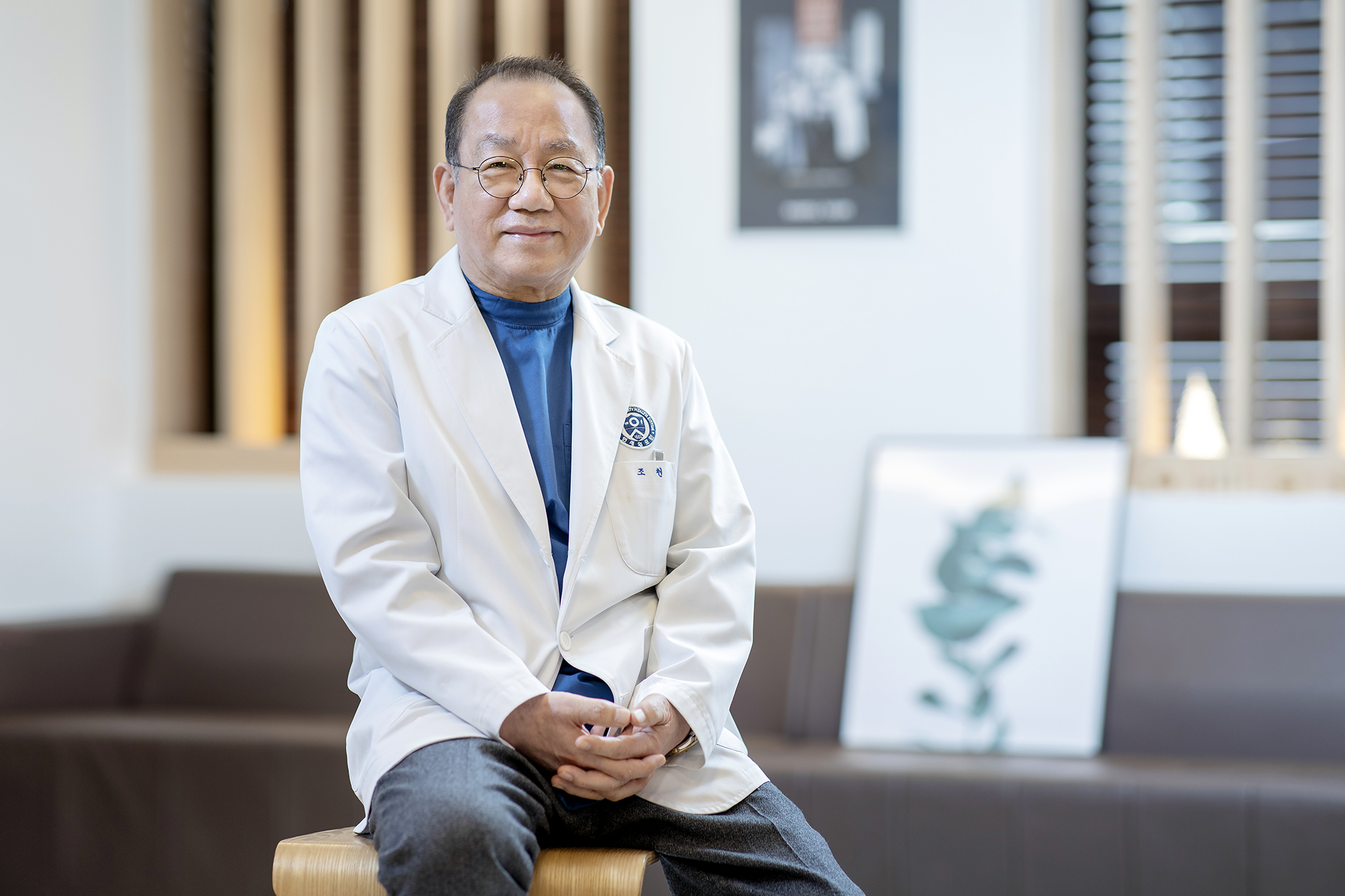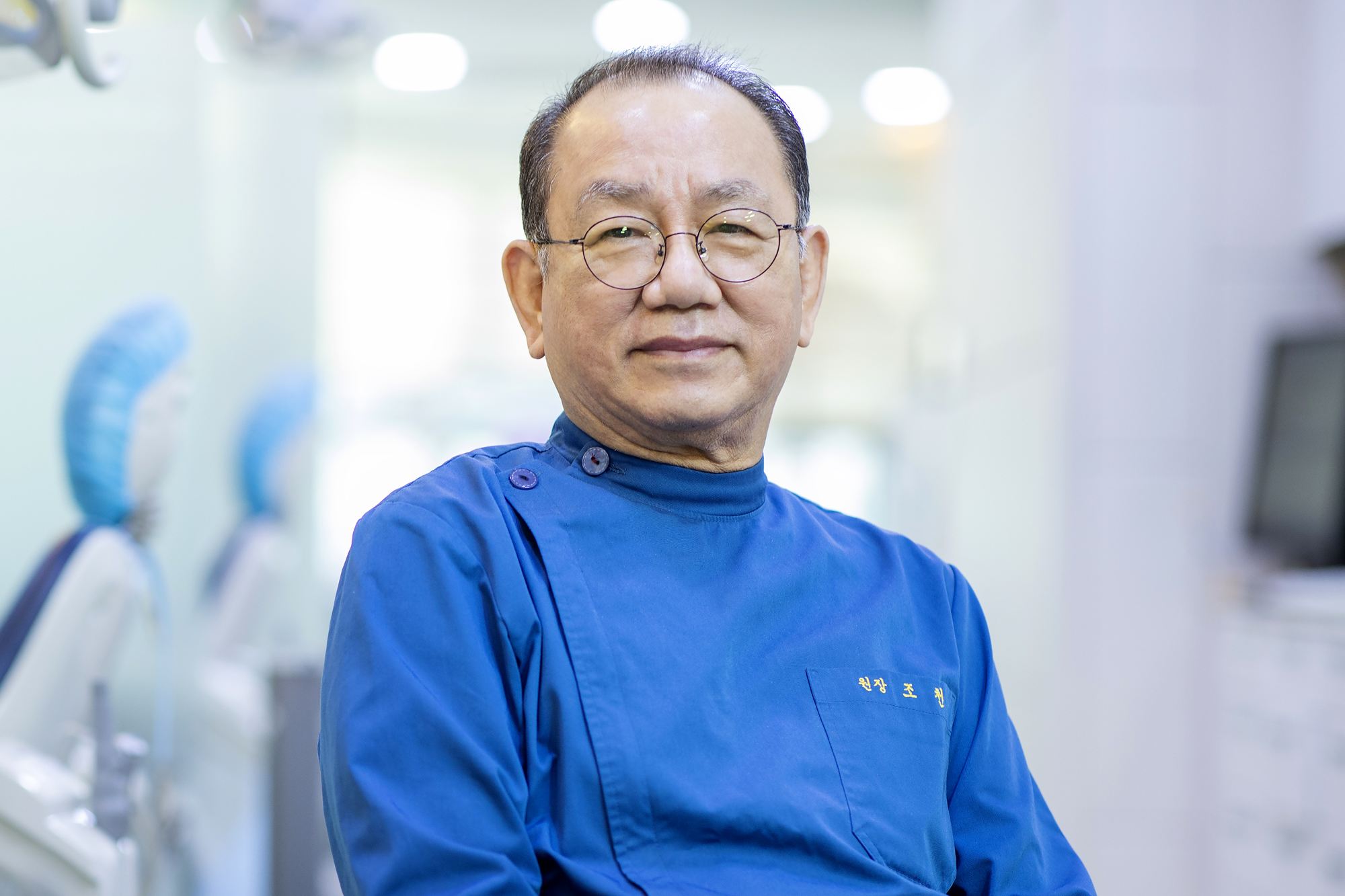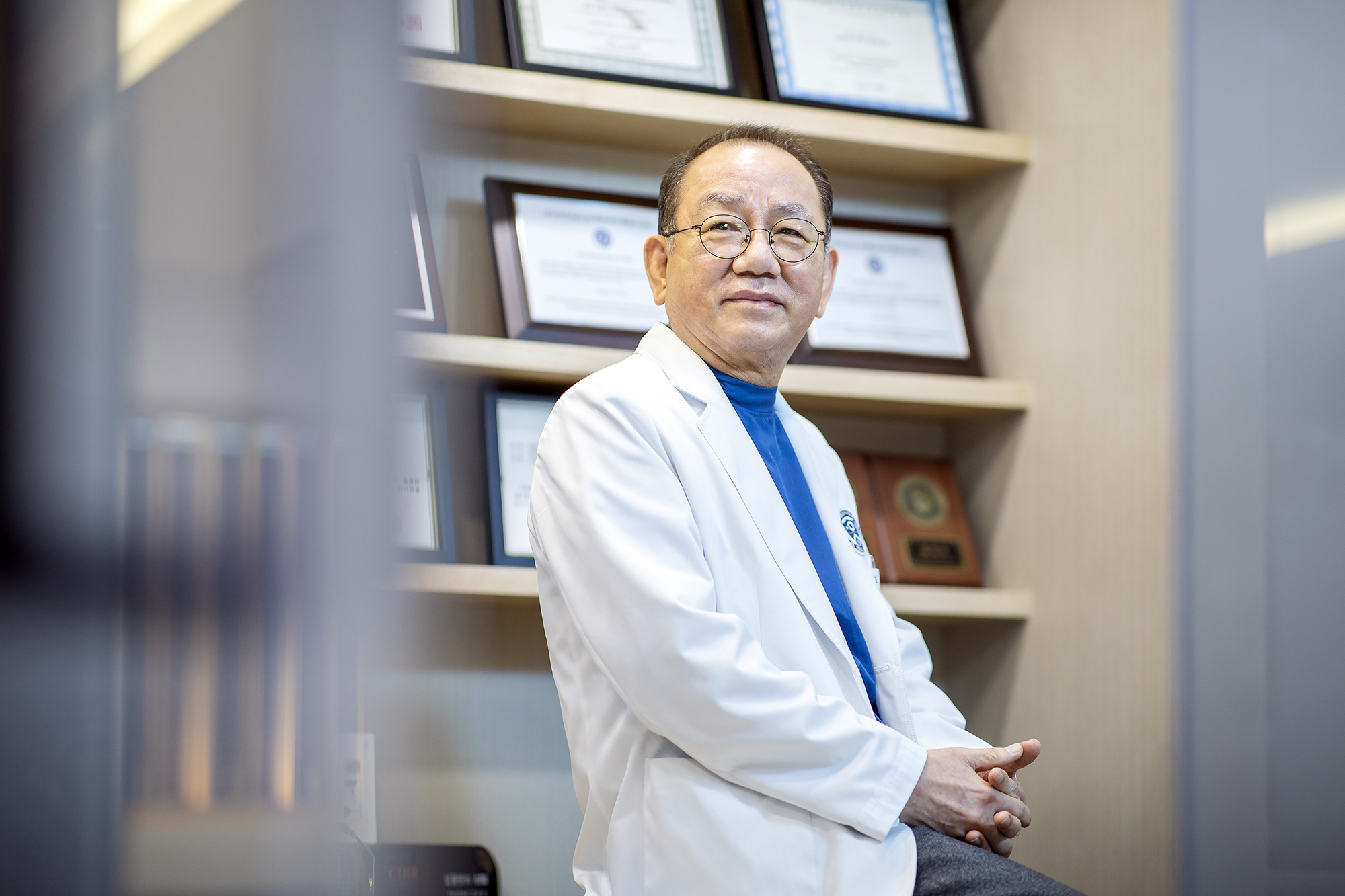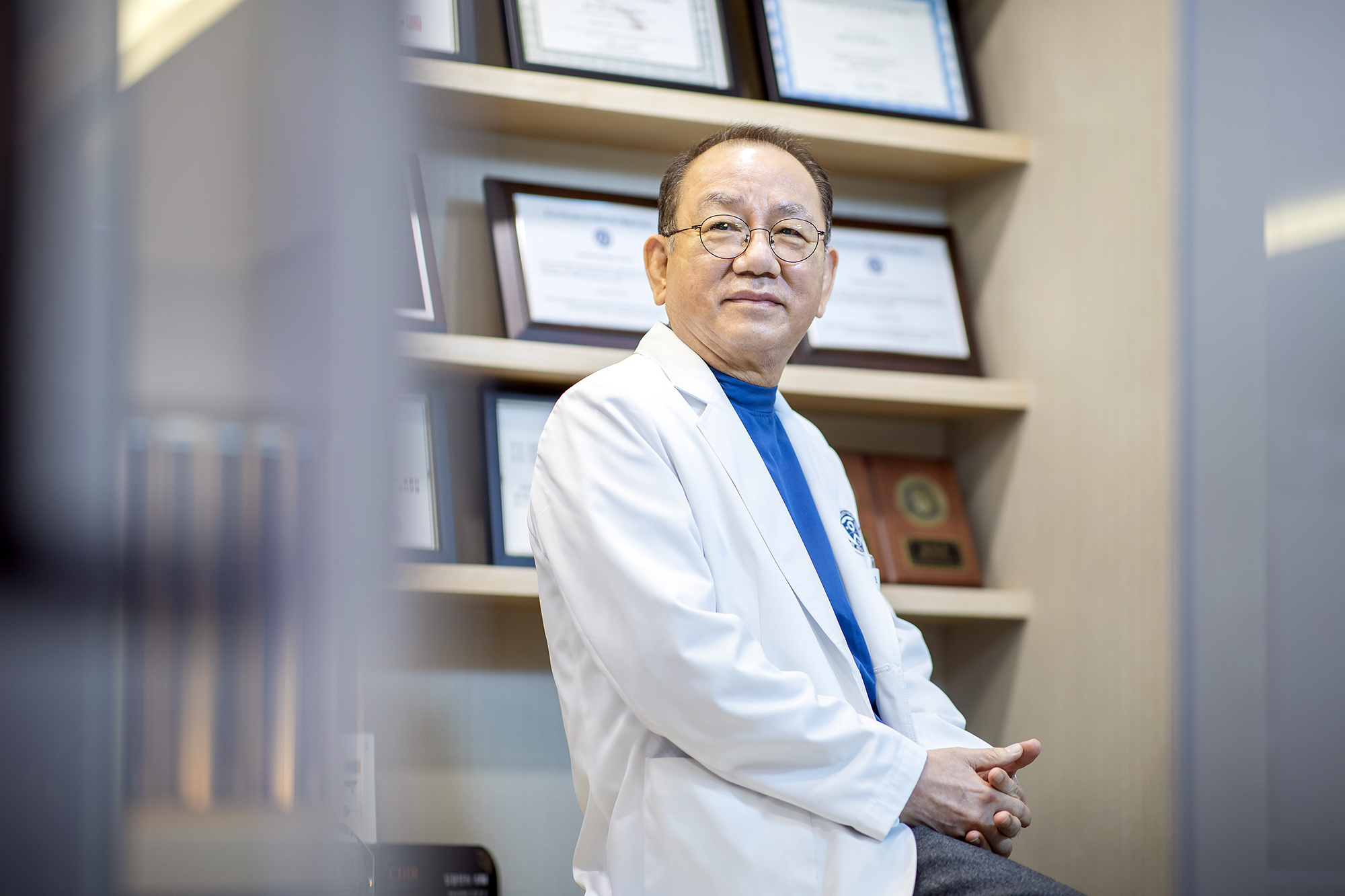- Finding the Ways to Coexistence Beyond Sharing March 31, 2021
-
Cho Chun (Dentistry, Entering Class of ’72), Dentist and the "Guardian Angel of Marginalized Migrants"

Dedicated Life for Marginalized Migrants
There are many migrants in South Korea. Most of them are members of multicultural families and North Korean defectors who have migrated from abroad. They came to Korea to find a better life, but it is hard for them to live as strangers. It is an inconvenient truth that they are faced with cultural differences, social prejudice, insufficient educational opportunities, and economic difficulties, which are passed down to their second generation.
Yonsei University alumnus CHO Chun, called as the ‘guardian angel of multicultural families and North Korean defectors,’ is dedicating his life for marginalized migrants by taking good care of them in Yeongju, Gyeongsangbuk-do (Province), rather than enjoying his life with material well-being and honor. He helps them build self-reliance so they can establish themselves as a member of the Korean community and live in harmony with people.
Worthwhile Experience in the Most Marginalized Place
Dr. Cho first decided to help others by accidentally reading an article in the Daily Dental newspaper about the Cheongsong Prison, which was suffering from a lack of dentists. There was no dentist wanting to go there due to safety concerns, such as threats and abusive language from inmates. When Dr. Cho closely examined the situation, the inmates’ wages for working in prison at that time were 2,000 won a day, while treatment was more than 10 times more expensive. As a result, the inmates had to endure the pain and save medical expenses. In some cases, they threatened medical staff by saying the treatment was wrong in order to get their money back. It led him to decide to give free medical treatment once a week.
“I was scared to give treatment in the prison at first, but over time, it became fun. At one time, a prisoner who had been treated took out a warm-roasted squid and gave it to me as a token of his gratitude. There weren’t many places in the prison where fire could be used at that time, and it would’ve cost a few days to buy a squid. It was extremely delicious. I can’t forget the taste and rewarding feeling during that moment.”
Cho requested the College of Dentistry of Yonsei University to carry out medical volunteer activities during the summer vacation in order to share the joy and reward of sharing. In 2002, the Yonsei medical staff, including Professor Chung Moon-Kyu, stayed in the prison for five days to provide free denture treatment, tooth extraction, and conservation treatment to some 340 inmates, delivering medicine of love to those who are alienated from society.

Confidence That Settlement of Migrants Begins with Self-Reliance
Dr. Cho, who was born and raised in Seoul, lived and settled down as a public health doctor in Yeongju, where his wife’s family lives. As he took a role as the chairman of the Security Cooperation Committee in Yeongju, he realized that there are many multicultural families and North Korean defectors in the city and that most of them have economic difficulties.
“I thought about how to solve this problem and tried various things. While providing free dental care, I also found a way for patients to pay only as much as they can afford or pay off their medical bills little by little. One elderly man has been paying some ten thousands of won each time over three years without forgetting. I was rather grateful for that.”
Multicultural families were easily broken by cultural differences or unstable life, and North Korean defectors lived only on subsidies and were unable to adapt to society. The biggest victims of such cases are children who have to live in an unstable life and prejudice. The fundamental solution he found was self-reliance beyond unilateral support or sharing.
“Basic subsidies, unilateral benefits, and sharing can undermine their willingness to adapt to society. It’s just a temporary solution and meaningless. I think it is not only necessary for them, but also for our society to have a solid foundation by having a job and becoming independent, not only to build economic independence, but also to coexist as members of our society.”
Dr. Cho continues to recommend them to build self-reliance since it is a great opportunity to end an unstable life. There are cases where people give up in the middle, but fortunately, there are cases where they use their talents and settle down well.
“There was one North Korean defector who was fluent in Chinese. I encouraged him to use his talents and after working at a trading company, he has established his own company and is running it well. In reality, even if you are talented and have obtained relevant certifications, there are cases where you are forced to move from one place to another because of prejudice against other areas such as the way of speaking. There is one foreign staff in our clinic, who studied Korean hard and is working as a nursing assistant. She is very smart. She is adapting to the environment well and our patients’ prejudice against her is gradually disappearing as she is talented.”
Belief That Education Is the Driving Force of Mutual Prosperity
Now, Cho plans to focus more on fundamental self-reliance, which goes beyond coexistence through self-reliance and moves toward mutual prosperity. At the core of this is ‘education.’ Just as missionaries came to Korea to establish schools, including Yonsei University, and cultivated talented people through education, which has become the driving force of social development, it is about seeking pathways to mutual prosperity through education.
“What I am currently preparing is to bring excellent middle and high school students from Southeast Asia and other parts of the world to provide opportunities to learn Korean culture, language, and vocational education so that they can create a family that suits themselves, maintain a stable life, and build self-reliance by finding a job in Korea. For them, it is an opportunity to reduce the difficulty of settling in Korea and contribute to social development as a member of our country. Or even after returning to their home country, it can be an opportunity to share the knowledge learned here and lead the development of that country. I think it’ll be a good opportunity to achieve mutual prosperity.”

Spirit of Community Connecting Generations of Alumni Family as the Greatest Asset
There are three dentists at Cho’s Yonsei Somang Dental Clinic. (‘Somang’ means wish or hope in Korean.) They all are alumni of Yonsei University, but surprisingly, they are his daughter and son-in-law. Although Cho did not force them to, the two chose to contribute to the local community in Yeongju by leaving behind wealth that they can enjoy in Seoul. Paying attention to and practicing the value of mutual prosperity is a family tradition that is naturally embedded in Jo’s family and is a great asset to them.
“We’re a Christian family, but my mother, in particular, couldn’t pass by a neighbor in need. My family seems to have been influenced a lot. Currently we’re making certain amount of donations per year, but it was in fact my sister in the United States who started donating the first patient’s medical bills every day for the past 30 years or so. In addition to my daughter and son-in-law, my elder sister and brother are also Yonsei alumni. It seems that the university’s ideology fits well with my family and we naturally became an alumni family. I’m always grateful for my university for giving me a good opportunity of learning.”
As the clinic is able to operate thanks to local patients, Dr. Cho’s family will continue to think about what they can do for the local community and commit themselves to coexisting with the local community for mutual prosperity. When the COVID-19 pandemic is over, they are planning to conduct a foreign youth invitation educational program, which is being prepared, in earnest. It seems like the most exciting project. It is Dr. Cho and his family’s hope to build a foundation for young people to participate in the activities that they have been carrying out so far.
According to Cho Chun, even the smallest sharing gives him full of joy. He is taking steps toward mutual prosperity in the community beyond helping marginalized neighbors. We look forward to his new journey that will pass down to future generations.
show mobile menu
mobile menu




